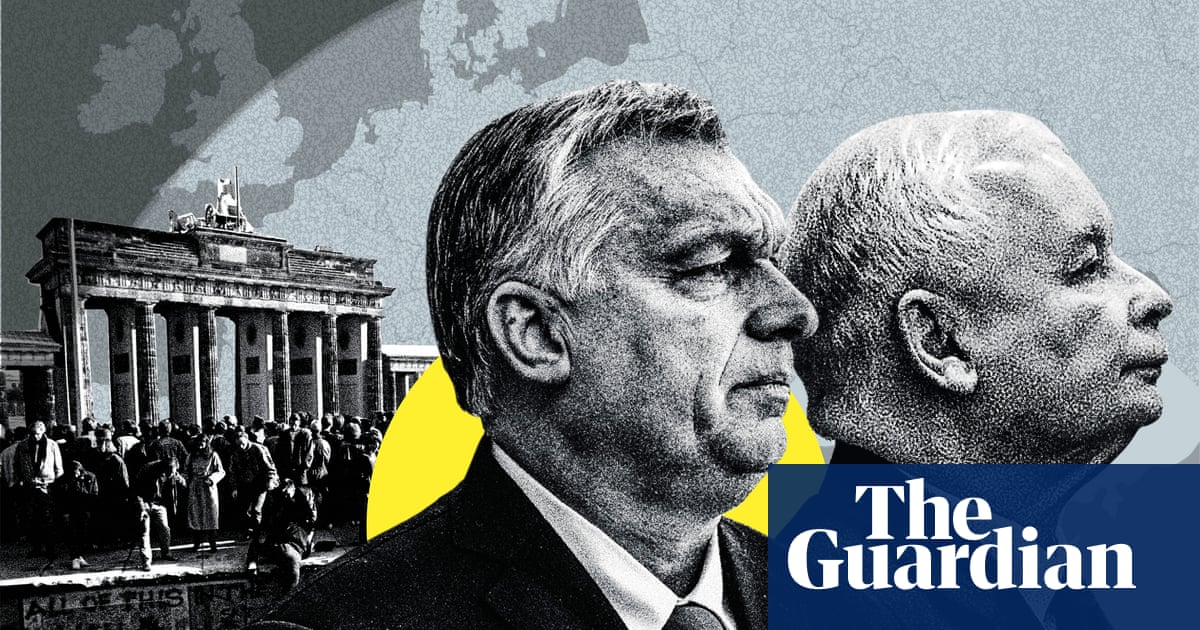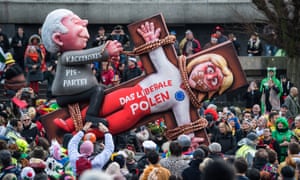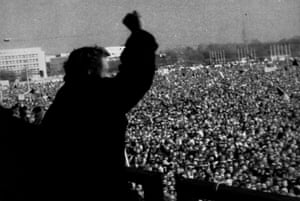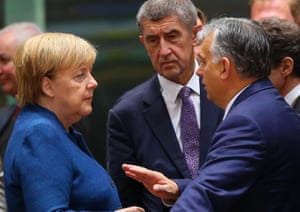The long read: After communism fell, the promises of western liberalism to transform central and eastern Europe were never fully realised and now we are seeing the backlash

In the spring of 1990, John Feffer, a 26-year-old American, spent several months criss-crossing eastern Europe in hope of unlocking the mystery of its post-communist future and writing a book about the historical transformation unfolding before his eyes. He was no expert, so instead of testing theories, he buttonholed as many people from as many walks of life as possible. The contradictions he encountered were fascinating and puzzling. East Europeans were optimistic but apprehensive. Many of those he interviewed at the time expected to be living like Viennese or Londoners within five years, 10 years at the most. But these hopes were mingled with anxiety and foreboding. As Hungarian sociologist Elemr Hankiss observed: People realised suddenly that in the coming years, it would be decided who would be rich and who would be poor; who would have power and who would not; who would be marginalised and who would be at the centre. And who would be able to found dynasties and whose children would suffer.
Feffer eventually published his book, but did not return to the countries that had briefly captured his imagination. Then, 25 years later, he decided to revisit the region and to seek out those with whom he had spoken in 1990. This time round, eastern Europe was richer but roiled by resentment. The capitalist future had arrived, but its benefits and burdens were unevenly, even crassly distributed. After reminding us that For the World War II generation in eastern Europe, communism was the god that failed, Feffer writes that For the current generation in the region, liberalism is the god that failed.
The striving of ex-communist countries to emulate the west after 1989 has been given an assortment of names Americanisation, Europeanisation, democratisation, liberalisation, enlargement, integration, harmonisation, globalisation and so forth but it has always signified modernisation by imitation and integration by assimilation. After the communist collapse, according to todays central European populists, liberal democracy became a new, inescapable orthodoxy. Their constant lament is that imitating the values, attitudes, institutions and practices of the west became imperative and obligatory.
Across central and eastern Europe, many of the democracies that emerged at the end of the cold war have been transformed into conspiracy-minded majoritarian regimes. In them, political opposition is demonised, non-government media, civil society and independent courts are denuded of their influence and sovereignty is defined by the leaderships determination to resist pressure to conform to western ideals of political pluralism, government transparency and tolerance for strangers, dissidents and minorities.
No single factor can explain the simultaneous emergence of authoritarian anti-liberalisms in so many differently situated countries in the second decade of the 21st century. Yet resentment at liberal democracys canonical status and the politics of imitation in general has played a decisive role. This lack of alternatives, rather than the gravitational pull of an authoritarian past or historically ingrained hostility to liberalism, is what best explains the anti-western ethos dominating post-communist societies today. The very conceit that there is no other way provided an independent motive for the wave of populist xenophobia and reactionary nativism that began in central and eastern Europe, and is now washing across much of the world.
When the cold war ended, racing to join the west was the shared mission of central and eastern Europeans. Indeed, becoming indistinguishably western was arguably the principal aim of the revolutions of 1989. The enthusiastic copying of western models, accompanied as it was by the evacuation of Soviet troops from the region, was initially experienced as liberation. But after two troubled decades, the downsides of this politics of imitation became too obvious to deny. As resentment seethed, illiberal politicians rose in popularity and, in Hungary and Poland, acceded to power.
In the first years after 1989, liberalism was generally associated with the ideals of individual opportunity, freedom to move and to travel, unpunished dissent, access to justice and government responsiveness to public demands. By 2010, the central and eastern European versions of liberalism had been indelibly tainted by two decades of rising social inequality, pervasive corruption and the morally arbitrary redistribution of public property into the hands of small number of people. The economic crisis of 2008 had bred a deep distrust of business elites and the casino capitalism that, writ large, almost destroyed the world financial order.
Liberalisms reputation in the region never recovered from 2008. The financial crisis greatly weakened the case, still being made by a handful of western-trained economists, for continuing to imitate American-style capitalism. Confidence that the political economy of the west was a model for the future of mankind had been linked to the belief that western elites knew what they were doing. Suddenly it was obvious that they did not. This is why 2008 had such a shattering ideological, not merely economic, effect.
Another reason why central and eastern populists have got away with exaggerating the dark sides of European liberalism is that the passage of time has erased from the collective memory the even darker sides of European illiberalism. Meanwhile, the ruling illiberal parties in central and eastern Europe, such as the Civic Alliance (Fidesz) in Hungary and Law and Justice party (PiS) in Poland, seek to discredit liberal principles and institutions in order to deflect from legitimate charges of corruption and abuse of power. To justify dismantling the independent press and judiciary, they claim that they are defending the nation against foreign-hearted enemies.

Yet focusing on the corruption and deviousness of illiberal governments in the region will not help us understand the sources of popular support for national populist parties. The origins of populism are undoubtedly complex. But they partly lie in the humiliations associated with the uphill struggle to become, at best, an inferior copy of a superior model. Discontent with the transition to democracy in the post-communist years was also inflamed by visiting foreign evaluators who had little grasp of local realities. These experiences combined to produce a nativist reaction in the region, a reassertion of authentic national traditions allegedly suffocated by ill-fitting western forms. The post-national liberalism associated with EU enlargement allowed aspiring populists to claim exclusive ownership of national traditions and national identity.
This was the mainspring of the anti-liberal revolt in the region. But a subsidiary factor was the unargued assumption that, after 1989, there were no alternatives to liberal political and economic models. This presumption spawned a contrarian desire to prove that there were, indeed, such alternatives. Take Germanys far-right populist party, Alternative fr Deutschland (AfD). As its name suggests, it was launched in response to Angela Merkels offhand claim that her monetary policy was alternativlos (without alternative). By describing the governments proposal as the only available option, she provoked an intense and implacable search for alternatives. A similar backlash, provoked by the assumed normality of post-nationalism, gave birth, in formerly communist countries, to an anti-liberal, anti-globalist, anti-migrant and anti-EU revolt, exploited and manipulated by populist demagogues who know how to demonise inner enemies to mobilise public support.
According to George Orwell, All revolutions are failures, but they are not all the same failure. So, what kind of failure was the revolution of 1989, given that its aim was western-style normality? To what extent was the liberal revolution of 1989 responsible for the illiberal counter-revolution unleashed two decades later?
The velvet revolutions that took place across central and eastern Europe in 1989 were largely unmarred by the human suffering that is usually part of root-and-branch political upheaval. Never before had so many deeply entrenched regimes been simultaneously overthrown and replaced using basically peaceable means. The left praised these velvet revolutions as expressions of popular power. The right extolled them as both a triumph of the free market over the command economy and the well-deserved victory of free government over totalitarian dictatorship. American and pro-American liberals, for their part, were proud to associate liberalism, routinely ridiculed by leftist critics as an ideology geared towards maintaining the status quo, with the romance of emancipating change. And, of course, these largely nonviolent changes of regime in the east were vested with world-historical significance since they marked the end of the cold war.
The non-violent nature of the revolutions of 1989 was not their only unique feature. Given the prominent public role played at the time by creative thinkers and savvy political activists such as Vclav Havel in Czechoslovakia and Adam Michnik in Poland, the events of 1989 are sometimes rem embered as revolutions of the intellectuals. But what ensured that these revolutions would remain velvet was a background hostility to utopias and political experiments. Far from craving anything ingeniously new, the leading figures in these revolutions aimed at overturning one system only in order to copy another.

Germanys foremost philosopher, Jrgen Habermas, warmly welcomed the lack of ideas that are either innovative or oriented towards the future after 1989, since for him the central and eastern European revolutions were rectifying revolutions or catch-up revolutions. Their goal was to enable central and eastern European societies to gain what the western Europeans already possessed.
Nor were central and eastern Europeans themselves, in 1989, dreaming of some perfect world that had never existed. They were longing instead for a normal life in a normal country. In the late 70s, when the German poet Hans Magnus Enzensberger visited Hungary and spoke with some of the best-known critics of the communist regime, what they told him was: We are not dissidents. We represent normality. Michniks post-communist slogan was Liberty, Fraternity, Normality. After decades of pretending to expect a radiant future, the main goal of the dissidents was to live in the present and to enjoy the pleasures of everyday life.
Central European elites saw imitation of the west as a well-travelled pathway to normality in this sense. But, encouraged by hopes of joining the EU, the reformers underestimated the local impediments to liberalisation and democratisation and overestimated the feasibility of importing fully worked-out western models. The wave of anti-liberalism sweeping over central Europe today reflects widespread popular resentment at the perceived slights to national and personal dignity that this palpably sincere reform-by-imitation project entailed.
In eastern and central Europe as a whole, euphoria at communisms collapse created the expectation that other radical improvements were in the offing. Some thought it would suffice for communist officials to quit their posts in order for central and eastern Europeans to wake up in different, freer, more prosperous and, above all, more western countries. When rapid westernisation did not magically materialise, an alternative solution began to gain favour. Leaving with ones family for the west became the preferred option.
Where once dissidents in countries such as Poland had associated emigration to the west with treasonous capitulation and desertion, after 1989 that view no longer made any sense. A revolution that defined its principal goal as westernisation could offer no persuasive objections to westward emigration. Why should a young Pole or Hungarian wait for his country to become one day like Germany, when he can start working and raising a family in Germany tomorrow? Democratic transitions in the region were basically a form of en masse removal to the west, and so the choice was only to emigrate early and individually or later and collectively.
Revolutions often force people to cross borders. After the French Revolution in 1789, and again in 1917 after the Bolsheviks seized power in Russia, the defeated enemies of the revolutions were the ones who left their countries. After 1989, the winners of the velvet revolutions, not the losers, were the ones who chose to decamp. Those most impatient to see their own countries changed were also the ones most eager to plunge into the life of a free citizenry, and were therefore the first to go to study, work and live in the west.
It is impossible to imagine that, after the victory of the Bolshevik Revolution, Trotsky would have decided to enrol at Oxford to study. But this is what the future Hungarian prime minister Viktor Orbn and many others did. The revolutionaries of 1989 were strongly motivated to travel to the west in order to observe up close how the kind of normal society they hoped to build at home actually worked in practice.
The massive flow of population out of the region in the post-cold war period, especially because so many young people were the ones voting with their feet, had profound economic, political and psychological consequences. When a doctor leaves the country, she takes with her all the resources that the state has invested in her education and deprives her country of her talent and ambition. The money that she would eventually send back to her family could not possibly compensate for the loss of her personal participation in the life of her native land.
The exodus of young and well-educated people has also seriously, perhaps fatally, damaged the chances of liberal parties to do well in elections. Youth exit may also explain why, in many countries across the region, we find beautiful EU-funded playgrounds with no kids to play in them. It is telling that liberal parties perform best among voters who cast their ballots abroad. In 2014, for example, Klaus Iohannis, a liberal-minded ethnic German, was elected president of Romania because the 300,000 Romanians living overseas voted massively in his favour. In a country where the majority of young people yearn to leave, the very fact that you have remained, regardless of how well you are doing, makes you feel like a loser.
The issues of emigration and population loss bring us to the refugee crisis that struck Europe in 201516. On 24 August 2015, Merkel, the German chancellor, decided to admit hundreds of thousands of Syrian refugees into Germany. Only 10 days later, on 4 September, the Visegrd group the Czech Republic, Hungary, Poland and Slovakia declared that the EUs quota system for distributing refugees across Europe was unacceptable. Central and east European governments were not buying Merkels humanitarian rhetoric. I think it is just bullshit, commented Mria Schmidt, Viktor Orbns intellectual-in-chief.
This was the moment when central Europes populists issued their declaration of independence not only from Brussels but also, more dramatically, from western liberalism and its ethos of openness to the world. Central Europes fearmongering populists interpreted the refugee crisis as conclusive evidence that liberalism weakened the capacity of nations to defend themselves in a hostile world.
The demographic panic that raged in central Europe from 2015 to 2018 is now fading to a degree. We still need to ask in any case why it would find such politically combustible material in central and eastern Europe, given that virtually no immigrants actually arrived in these countries.

The first reason, as mentioned, is emigration. Anxiety about immigration is fomented by a fear that supposedly unassimilable foreigners will enter the country, dilute national identity and weaken national cohesion. This fear, in turn, is fuelled by a largely unspoken preoccupation with demographic collapse. In the period 19892017, Latvia haemorrhaged 27% of its population, Lithuania 22.5%, and Bulgaria almost 21%. In Romania, 3.4 million people, a vast majority of them younger than 40, left the country after it joined the EU in 2007. The combination of an ageing population, low birth rates and an unending stream of emigration is arguably the source of demographic panic in central and eastern Europe. More central and eastern Europeans left their countries for western Europe as a result of the 2008-9 financial crises than all the refugees that came there as the result of the war in Syria.
The extent of post-1989 emigration from eastern and central Europe, awakening fears of national disappearance, helps explain the deeply hostile reaction across the region to the refugee crisis of 2015-16, even though very few refugees have relocated to the countries of the region. We might even hypothesise that anti-immigration politics in a region essentially without immigrants is an example of what some psychologists call displacement a defence mechanism by which, in this case, minds unconsciously blot out a wholly unacceptable threat and replace it with one still serious but conceivably easier to manage. Hysteria about non-existent immigrants about to overrun the country represents the substitution of an illusory danger (immigration) for the real danger (depopulation and demographic collapse) that cannot speak its name.
Fear of diversity and fear of change, inflamed by the utopian project of remaking whole societies along western lines, are thus important contributors to eastern and central European populism. The trauma of people pouring out of the region explains what might otherwise seem mysterious the strong sense of loss even in countries that have benefited handsomely from post-communist political and economic change. Across Europe, analogously, the areas that have suffered the greatest haemorrhaging of population in the last decades are the ones most inclined to vote for far-right parties.
Eastern European governments, haunted by the fear of demographic collapse, are looking for reasons why their discontented citizens, especially their youth, should hesitate to move to western Europe. Orbn sometimes sounds as if he would like to implement a closed-country policy with a ruthlessly enforced veto on emigration as well as immigration. But since he has no way of doing anything of the sort, he is reduced to pleading with young Hungarians not to move away. How to convince young Hungarians that they will not find a better homeland in the west, especially when Orbns own policies are destroying most chances for living rewarding and creative lives inside the country?
Populists in Warsaw and Budapest seem to have turned the refugee crisis in the west into a branding opportunity for the east. Citizens will stop leaving for the west only if the west loses its allure. Dispraising the west and declaring its institutions not worth imitating can be explained as imaginary revenge born of resentment. But it has the collateral benefit of serving the regions number one policy priority, by helping discourage emigration. Populists rail against the way western Europe has welcomed Africans and Middle Easterners. But their real complaint is that western members of the EU have opened their doors invitingly to central and eastern Europeans themselves, potentially depriving the region of its most productive citizens.
This entire discussion brings us to a core idea of contemporary illiberalism. Contrary to many contemporary theorists, populist rage is directed less at multiculturalism than at individualism and cosmopolitanism. This is an important point politically because, if accepted, it implies that populism cannot be combatted by abandoning multiculturalism in the name of individualism and cosmopolitanism. For the illiberal democrats of eastern and central Europe, the gravest threat to the survival of the white Christian majority in Europe is the incapacity of western societies to defend themselves. They cannot defend themselves because the reigning individualism and cosmopolitanism allegedly blinds them to the threats they face.
Illiberal democracy promises to open citizens eyes. If the liberal consensus of the 1990s was about individual legal and constitutional rights, the anti-liberal consensus today is that the rights of the threatened white Christian majority are in mortal danger. To protect this besieged majoritys fragile dominance from the insidious alliance of Brussels and Africa, the argument goes, Europeans need to replace the watery individualism and universalism foisted on them by liberals with a muscular identity politics or group particularism of their own. This is the logic with which Orbn and the leader of PiS in Poland, Jarosaw Kaczyski, have tried to inflame the inner xenophobic nationalism of their countrymen.
The ultimate revenge of the central and eastern European populists against western liberalism is not merely to reject the idea of imitating the west, but to invert it. We are the real Europeans, Orbn and Kaczyski repeatedly claim, and if the west will save itself, it will have to imitate the east. As Orbn said in a speech in July 2017: Twenty-seven years ago here in Central Europe, we believed that Europe was our future; today we feel that we are the future of Europe.
This is an edited extract from The Light That Failed: A Reckoning by Ivan Krastev and Stephen Holmes, published by Allen Lane on 31 October and available at guardianbookshop.com
Follow the Long Read on Twitter at @gdnlongread, and sign up to the long read weekly email here.


Recent Comments